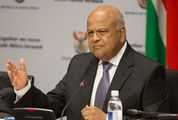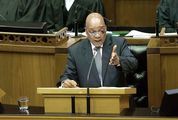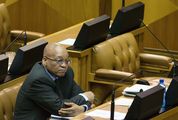CAN business and the government work together to pull SA through a very difficult period? Many people believe we are in the midst of an economic crisis. If it is not yet a crisis, probably most would say that we’re heading for one.
The economic situation, and its social consequences for poverty, unemployment and inequality, are clearly unsustainable — economically and politically.
The events of December last year, triggered when President Jacob Zuma replaced the minister of finance, significantly changed SA’s economic outlook. The business community — especially the financial sector and the stock market — received a sudden shock.
Economic growth is the oxygen of our democratic project, and indeed, the continuing transformation of the South African political economy.
Without economic growth, it is very difficult to conceive of how either the private sector or the state will be able to generate additional resources. Without these resources, the country will be unable to implement the programmes needed to deal with our socioeconomic challenges.
We are all cognisant of the exchange rate decline, interest rate increases, the potential for further taxation and the general fiscal difficulties we face, including a credit rating downgrade looming on the horizon.
On the plus side, Finance Minister Pravin Gordhan is taking significant steps, as evidenced by his recent statements, the meetings in Davos, and other meetings with business leaders, to inject a level of confidence and determination to avoid the worst economic outcomes.
Looking ahead, the policy approaches of Zuma and Gordhan and, importantly for business, the content of the budget speech, will be very important indicators of SA’s determination to deal with these fiscal and other challenges.
It is, therefore, clear that leaders in all sectors, including business, need to recalibrate the time, energy and financial resources needed to ensure there is confidence and coherence at the top level in this country to enable action both in the short and long term.
...
DECISIVE moves are needed over the next three months to avoid the rating downgrade. But just as important would be to give the international investment community, as well as the South African public, a sense of confidence that the government and business can work together.
Working in tandem, they need to communicate more effectively, to develop new programmes and ideas, and to provide the critically needed linkages and feedback about what is not functioning the way it should.
In short, the government should inform business what it thinks business needs to do to deal with its issues, and business needs to inform the government about the vital areas that are hampering investment and economic growth.
Recent meetings seem promising, among them the African National Congress lekgotla, where according to its secretary-general, Gwede Mantashe, there was a major focus on the economy.
Other meetings are planned and these are signs that the economic debate is now being taken very seriously, both in the governing party and in the Cabinet.
It is vital that positive formal and informal processes are accelerated to ensure that there is mutual understanding and, wherever possible, consensus on practical steps that need to be taken in the short term.
The next three months will be a vital indicator of the country’s direction over the next three years.
No economist is predicting a rapid economic turnaround, but local business has surmounted many difficulties before and has deep resilience and institutional strength.
Good partnership and a building of trust is vital in this period and business and government leaders need to take further the constructive start to this year after December’s very difficult shock.
...
IF STRATEGY is about what to do next in a changing world, grand strategy is about integrating a higher-level view of the future. In the current set of circumstances, grand strategy for business must include how it deals with the government and the social sector in a framework of mutual compromise and consensus.
It’s no good running your business in a failing economy if you don’t have confidence in the future. Business has a direct vested interest in assisting to make that future what it should be for the good of all.
The voices, both formal and informal, as well as the agencies that represent business, are undoubtedly recalibrating their approach, given the circumstances on their plates. The same needs to be done in the government to ensure the economy is placed front and centre, both in its policy and administrative actions.
In times of difficulty the government and business must re-engage with new vigour in order to carefully consider the synergy of their mutual interests. Folly is when knowing better you miscalculate your own interests. That must be avoided at all costs.
• Binedell is professor of leadership and strategy at the Gordon Institute of Business Science

Instead of pulling in opposite directions, business and the government must work together. Picture: ISTOCK
CAN business and the government work together to pull SA through a very difficult period? Many people believe we are in the midst of an economic crisis. If it is not yet a crisis, probably most would say that we’re heading for one.
The economic situation, and its social consequences for poverty, unemployment and inequality, are clearly unsustainable — economically and politically.
The events of December last year, triggered when President Jacob Zuma replaced the minister of finance, significantly changed SA’s economic outlook. The business community — especially the financial sector and the stock market — received a sudden shock.
Economic growth is the oxygen of our democratic project, and indeed, the continuing transformation of the South African political economy.
Without economic growth, it is very difficult to conceive of how either the private sector or the state will be able to generate additional resources. Without these resources, the country will be unable to implement the programmes needed to deal with our socioeconomic challenges.
We are all cognisant of the exchange rate decline, interest rate increases, the potential for further taxation and the general fiscal difficulties we face, including a credit rating downgrade looming on the horizon.
On the plus side, Finance Minister Pravin Gordhan is taking significant steps, as evidenced by his recent statements, the meetings in Davos, and other meetings with business leaders, to inject a level of confidence and determination to avoid the worst economic outcomes.
Looking ahead, the policy approaches of Zuma and Gordhan and, importantly for business, the content of the budget speech, will be very important indicators of SA’s determination to deal with these fiscal and other challenges.
It is, therefore, clear that leaders in all sectors, including business, need to recalibrate the time, energy and financial resources needed to ensure there is confidence and coherence at the top level in this country to enable action both in the short and long term.
...
DECISIVE moves are needed over the next three months to avoid the rating downgrade. But just as important would be to give the international investment community, as well as the South African public, a sense of confidence that the government and business can work together.
Working in tandem, they need to communicate more effectively, to develop new programmes and ideas, and to provide the critically needed linkages and feedback about what is not functioning the way it should.
In short, the government should inform business what it thinks business needs to do to deal with its issues, and business needs to inform the government about the vital areas that are hampering investment and economic growth.
Recent meetings seem promising, among them the African National Congress lekgotla, where according to its secretary-general, Gwede Mantashe, there was a major focus on the economy.
Other meetings are planned and these are signs that the economic debate is now being taken very seriously, both in the governing party and in the Cabinet.
It is vital that positive formal and informal processes are accelerated to ensure that there is mutual understanding and, wherever possible, consensus on practical steps that need to be taken in the short term.
The next three months will be a vital indicator of the country’s direction over the next three years.
No economist is predicting a rapid economic turnaround, but local business has surmounted many difficulties before and has deep resilience and institutional strength.
Good partnership and a building of trust is vital in this period and business and government leaders need to take further the constructive start to this year after December’s very difficult shock.
...
IF STRATEGY is about what to do next in a changing world, grand strategy is about integrating a higher-level view of the future. In the current set of circumstances, grand strategy for business must include how it deals with the government and the social sector in a framework of mutual compromise and consensus.
It’s no good running your business in a failing economy if you don’t have confidence in the future. Business has a direct vested interest in assisting to make that future what it should be for the good of all.
The voices, both formal and informal, as well as the agencies that represent business, are undoubtedly recalibrating their approach, given the circumstances on their plates. The same needs to be done in the government to ensure the economy is placed front and centre, both in its policy and administrative actions.
In times of difficulty the government and business must re-engage with new vigour in order to carefully consider the synergy of their mutual interests. Folly is when knowing better you miscalculate your own interests. That must be avoided at all costs.
• Binedell is professor of leadership and strategy at the Gordon Institute of Business Science



























Change: 1.71%
Change: 2.02%
Change: 1.63%
Change: 2.03%
Change: 1.45%
Data supplied by Profile Data
Change: 1.27%
Change: 1.29%
Change: 1.70%
Change: 0.00%
Change: 1.13%
Data supplied by Profile Data
Change: 0.05%
Change: 0.54%
Change: 0.18%
Change: 0.36%
Change: 0.11%
Data supplied by Profile Data
Change: -0.33%
Change: -0.97%
Change: -0.86%
Change: -0.41%
Change: 0.51%
Data supplied by Profile Data